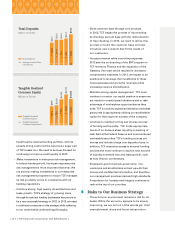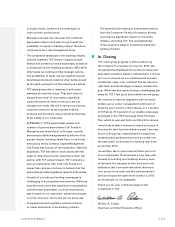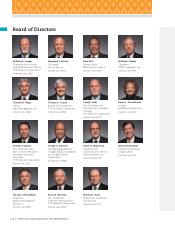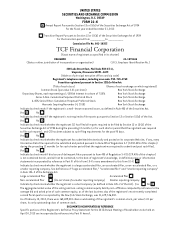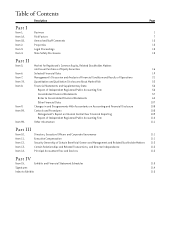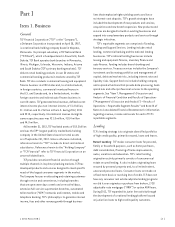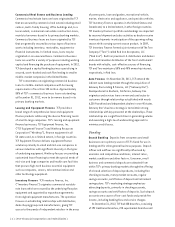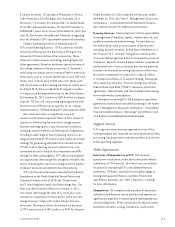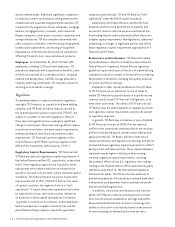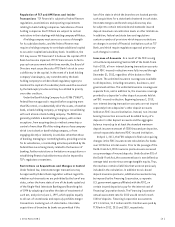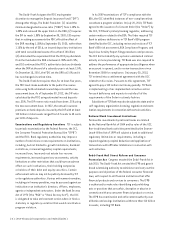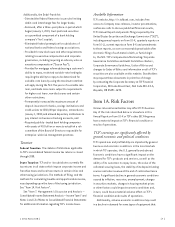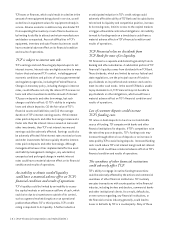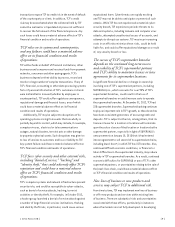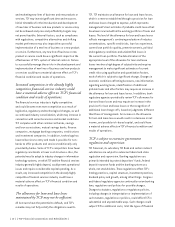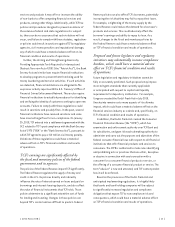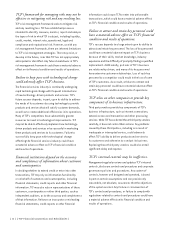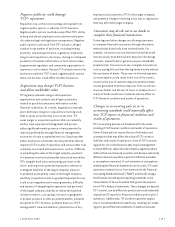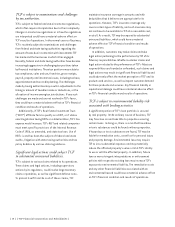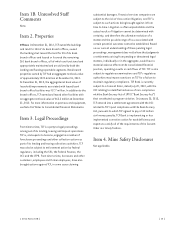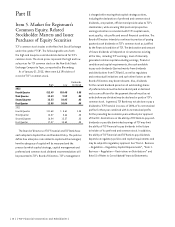TCF Bank 2012 Annual Report Download - page 22
Download and view the complete annual report
Please find page 22 of the 2012 TCF Bank annual report below. You can navigate through the pages in the report by either clicking on the pages listed below, or by using the keyword search tool below to find specific information within the annual report.The Dodd-Frank Act gave the FDIC much greater
discretion to manage the Deposit Insurance Fund (“DIF”).
Among other things, The Dodd-Frank Act: (1) raised the
minimum designated reserve ratio (“DRR”) from 1.15% to
1.35% and removed the upper limit on the DRR; (2) requires
the DIF to reach 1.35% by September 30, 2020; (3) requires
that in setting assessments the FDIC offset the effect of
the DRR reaching 1.35% by September 30, 2020, rather than
1.15% by the end of 2016, on insured depository institutions
with total consolidated assets of less than $10 billion;
(4) eliminated the requirement that the FDIC pay dividends
from the fund when the DRR is between 1.35% and 1.5%;
and (5) continued the FDIC’s authority to declare dividends
when the DRR at the end of a calendar year is at least 1.5%.
On December 15, 2010, the FDIC set the DRR at 2.0% and it
has not changed since that time.
The Dodd-Frank Act requires that, for at least five years,
the FDIC must make available to the public the reserve
ratio using both estimated insured deposits and the new
assessment base. As of September 30, 2012, the DIF ratio
calculated by the FDIC using estimated insured deposits
was .35%. The DIF reserve ratio would have been .21% using
the new assessment base. In 2012, the annual insurance
premiums on bank deposits insured by the DIF with at least
$10 billion in total assets ranged from 2.5 cents to 45 cents
per $100 of deposits.
Examinations and Regulatory Sanctions TCF is subject
to periodic examination by the Federal Reserve, the OCC,
the Consumer Financial Protection Bureau (the “CFPB”)
and the FDIC. Bank regulatory authorities may impose a
number of restrictions or new requirements on institutions,
including, but not limited to, growth limitations, dividend
restrictions, increased regulatory capital requirements,
increased loan, lease and real estate loss reserve
requirements, increased supervisory assessments, activity
limitations or other restrictions that could have an adverse
effect on such institutions, their holding companies
or holders of their debt and equity securities. Certain
enforcement actions may not be publicly disclosed by TCF
or its regulatory authorities. Various enforcement remedies,
including civil money penalties, may be assessed against an
institution or an institution’s directors, officers, employees,
agents or independent contractors. Under the Bank Secrecy
Act of 1970 (the “BSA” or “Bank Secrecy Act”), the OCC
is obligated to take enforcement action where it finds a
statutory or regulatory violation that would constitute a
program violation.
In its 2009 examinations of TCF’s compliance with the
BSA, the OCC identified instances of non-compliance that
constitute a program violation. On July 20, 2010, TCF Bank
agreed to the issuance of a Consent Order (the “Order”) by
the OCC, TCF Bank’s primary banking regulator, addressing
certain matters related to the BSA. The Order required TCF
Bank to address deficiencies in TCF Bank’s BSA program
identified by the OCC, including review and revision of TCF
Bank’s BSA risk assessment, BSA Compliance Program, and
Suspicious Activity Report filing procedures and processes.
The OCC did not identify any systemic undetected criminal
activity or money laundering. TCF Bank was also required to
address the performance of appropriate due diligence when
an account is opened, and to review transactions since
November 2008 for compliance. On January 25, 2013,
TCF entered into a settlement agreement with the OCC
related to this review. Pursuant to this agreement, TCF
agreed to pay a $10 million civil money penalty. TCF Bank
is implementing or has implemented corrective action
for each deficiency and expects to satisfy all of the
requirements of the Order in a timely fashion.
Subsidiaries of TCF Bank may also be subject to state and/or
self-regulatory organization licensing, regulation and exam-
ination requirements in connection with certain activities.
National Bank Investment Limitations
Permissible investments by national banks are limited
by the National Bank Act of 1864 and by rules of the OCC.
Non-traditional bank activities permitted by the Gramm-
Leach-Bliley Act of 1999 will subject a bank to additional
regulatory limitations or requirements, including a
required regulatory capital deduction and application of
transactions with affiliates limitations in connection with
such activities.
Dodd-Frank Wall Street Reform and Consumer
Protection Act Congress enacted the Dodd-Frank Act in
July 2010. The Dodd-Frank Act created the CFPB and gave it
broad rulemaking authority to administer and carry out the
purposes and objectives of the federal consumer financial
laws, with respect to all financial institutions that offer
financial products and services to consumers. The CFPB
is authorized to make rules identifying and prohibiting
acts or practices that are unfair, deceptive or abusive in
connection with any consumer financial product or service.
The CFPB has examination and enforcement authority over
all banks and savings institutions with more than $10 billion
in assets, including TCF Bank.
{ 6 } { TCF Financial Corporation and Subsidiaries }


